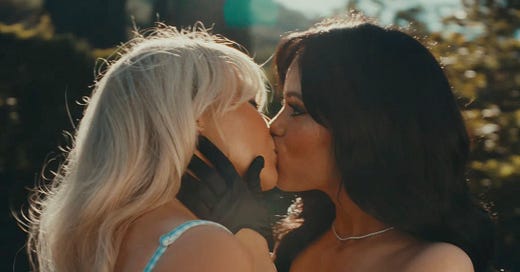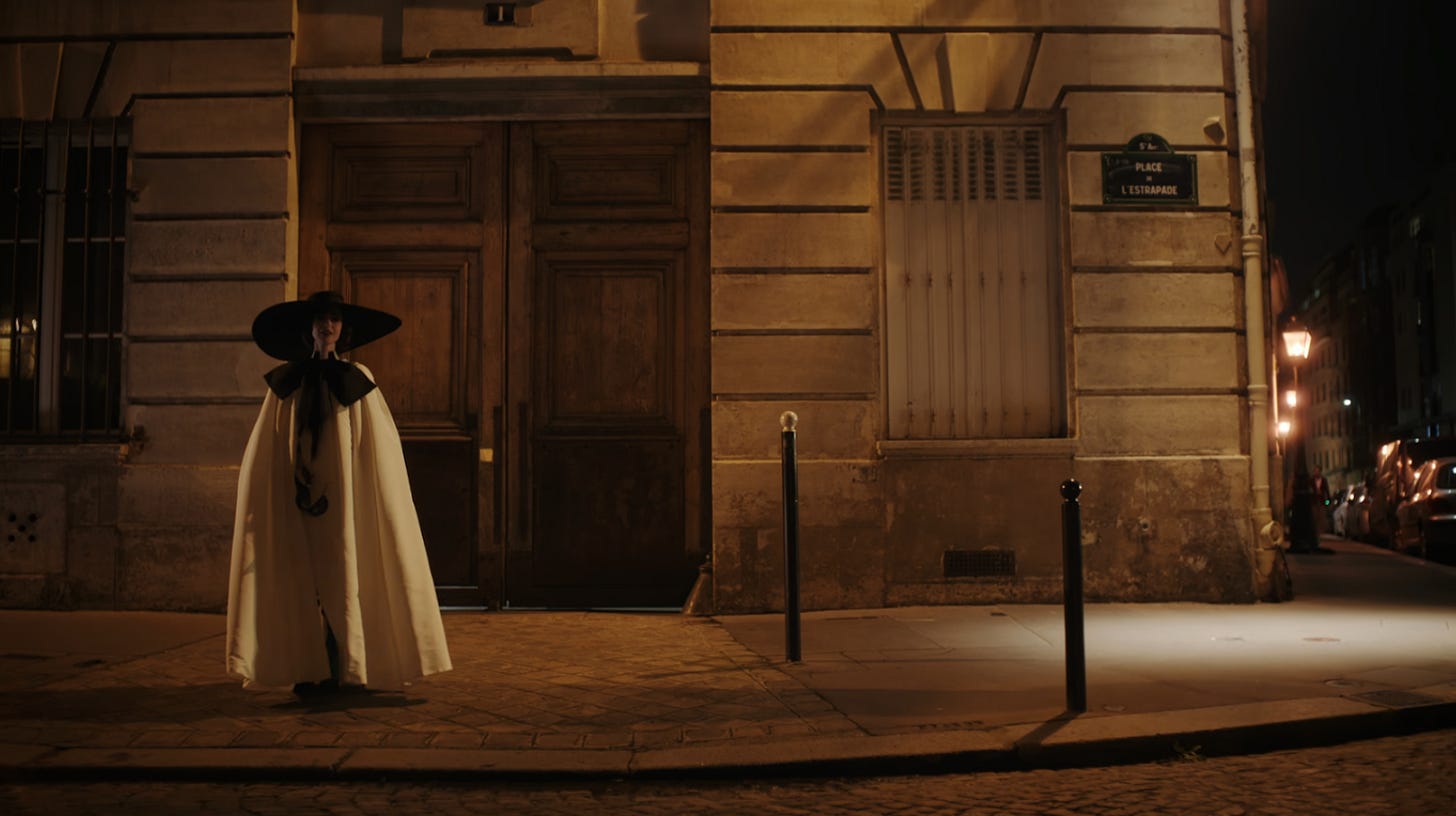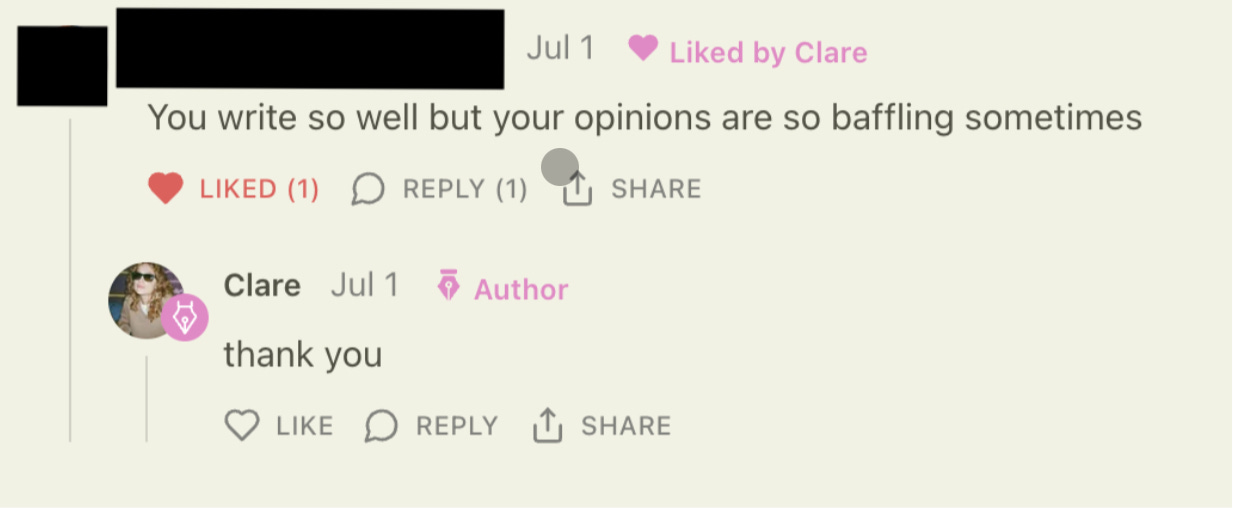Housekeeping:
Megalopolis Mania has never been more back. This news cycle has come and gone so ferociously I cannot possibly comment on it now, but know:
I started reading Slammed by Colleen Hoover and the protagonist is named Layken.
I recently admitted to having seen the first two seasons of Emily in Paris more than once, but I will reiterate that they are amazing. It takes a lot for me to turn so sharply on one of my “programs”—I will not concede that And Just Like That… has ever been bad, because I don’t believe that is the truth—but the third season of Emily in Paris made me want to find out where Darren Star lives. I don’t even remember what happens, except that Emily dates the ex of two Little Mix members for too long. That something so fun, so utterly jovial and aesthetically satisfying, could be defiled like that depressed me for months. Though it adequately prepared me for last week’s release of season 4 part 1, which is somehow less memorable and more boring.1
These episodes got me thinking about the wish-fulfillment genre and why Emily in Paris was ever good in the first place. It wasn’t the fashion—Kangol—or hot guys—fine—but a fetishistic spectacle of a woman for whom everything is new and scandalizing. The show is in on the joke that Emily is a moron, but still indulges in her childlike sense of discovery, not entirely unlike the way early SATC treats Charlotte. Emily isn’t a freak, nor is she relatable. She is unattainably normal.
Another thing that was recently released was Gracie Abrams’ debut album, which was almost as boring as Emily in Paris season 4 part 1. I wanted to like The Secret of Us because I think it is laugh-out-loud funny that JJ Abrams’ daughter is beautiful and wants us to take her music seriously. But it reads as a Taylor Swift cover album, a very literal and try-hard impression of Swift’s voice and lyrical rhythm, thudding flat on the floor because it is palpably not Taylor Swift.
I recently called Taylor Swift the “coolest girl in every room,” which prompted this response from a stranger:
It is often difficult for people tangential to my social sphere to comprehend why I think Taylor Swift is cooler than, say, Charli xcx. Mostly it is because Swift has, in Ben’s words, “a Daniel Planviewesque view of other people.” She is delusionally confident, has everything she wants, and everything everyone else wants, too. It is the way this supervillain aura is tessellated with the wardrobe of a Big 10 sophomore, however, that charms and delights me. None of her successes should be happening to a woman who dresses like that, and yet she drinks my milkshake, she drinks it up.2
Critics often label Taylor Swift’s personal aesthetic as “basic,” which is true: she is happy wearing skater skirts. Though “basic” carries with it specific cultural connotations I don’t think Swift otherwise aligns with: she’s not stupid or culturally disengaged, and is she not sheltered or sexually neutered. Gracie Abrams is more basic, in the traditional sense, as she doesn’t really seem to speak, has gotten the trendy short haircut, and her “art” speaks more empty platitudes than revealing or rhythmically satisfying folklore.
What saves Taylor Swift from true basicdom, in other words, is that the skater skirts don’t conceal the fact that she is evil or a drunken mess. In fact, the way TS is the most basic is in the way she behaves like your friends in high school, curating a Christian aesthetic while saying the grossest, meanest things you’ve ever heard in your life. While Gracie Abrams is trying very hard to be Taylor Swift, and is perhaps the pop star most openly biting TS’s schtick, the person best poised to replace Taylor when she is next hated for 1-3 years is Sabrina Carpenter.
I have been vaguely aware of Sabrina for as long as she’s been around, but emails i can’t send, to my knowledge her first real post-Disney hoist toward fame, is boring. Led by One Direction’s steadiest producer (John Ryan), close “Madison Beer” collaborator (Leroy Clampitt[?]), and some joker who would go on to make Renee Rapp’s similarly boring junk (Skyler Stonestreet), emails speaks to a moment with no invention of its own. Carpenter’s followup, made endlessly more muscular by her participation in the Eras Tour, keeps the One Direction guy and adds pop heavyweights Ian Kirkpatrick and and Jack Antonoff to create radio slop that is exciting, inventive, and most importantly, fun.
I am partial to the Bleachers sound of now, but Sabrina’s recent interpretation of Jackin Off’s synth—brightened by a veneer of Italian summer and strange, gravelly vocals of an 80s Europop star—is a bit indisputable. Though the album’s “sound” is its weakest element: we are already intimately familiar with Jack Antonoff. While Sabrina has a nice voice, it’s never impressive like Ariana’s or affecting like when Taylor Swift screams, either. The album’s most exciting contribution is its specific, crass lyrics that weave tales of sexual fantasies and cheating like country-twinged folksongs of yore.
Sabrina has been curating a “mean” aesthetic for some time, speaking flippantly about boys and killing them in music videos. I found this cloying in “Feather,” whose boring music video carried a tiresome “sexy in church” controversy; how many more decades do we have to do that? Until “Espresso,” in fact, I kept my distance from Sabrina because she seemed a truly basic girl attempting to hide her basicness behind Dolls Kill platforms and sexy murder—she’s not like other girls!!—with no music to back it up. ModClothesque gimmick with songs that 10 years ago would have been given to Alessia Cara is not exciting. “Switch it up like Nintendo”? I’m listening.
The wordplay on the rest of Short n’ Sweet is just as relentless and even more folksy, with “Coincidence” following a near-three-act structure to interrogate a boyfriend driving “from LA to her thighs” and “Dumb & Poetic” serving truly cruel one-liners like “Gold star for highbrow manipulation / And ‘love everyone’ is your favorite quotation.” This meanness, reliant more on lyrical exactitude than mall goth music videos, reminds me of “She’s better known for the things that she does on the mattress.”
More interesting is that, in “Juno,” named for a pregnancy fantasy, she says “I’m so fucking horny.” The album’s third single “Taste” is named for someone’s girlfriend tasting Sabrina on the boyfriend because Sabrina’s been “known to share.” These songs remind me of “break up with your girlfriend, i’m bored” and “positions” in their (increasingly maligned) embrace of girls having sex, except they are not painful to hear nor performed by a woman so obviously strange and wanting of black culture. When Sabrina jokes about having sex and cheating, it reads as earnest as it does desperate and mean: “give you my wild / give you a child.”
Saying “Sabrina Carpenter is like Taylor Swift” is something that should get me put in Substack jail—like, thanks for the analysis—but I have a point: they are basic in the same way, the way Emily of Paris used to be. Since when aren’t having sex and cheating (both things Emily used to do) cool for beautiful, frustratingly successful women to do? A very loud minority who take umbrage with Ariana Grande supposedly stealing a husband away from his wife, or with Jack Schlossberg “being a cheater” (you can look this up yourself on x.com), would have you think mainstream coolness has turned away from cheating and sex and toward being nice all of the time and only dating someone who is the same age as you down to the hour. But those people would also have you believe Brat is a mainstream smash hit, when its songstress just got the Australian Vogue cover almost 3 months after its release.
Sabrina Carpenter’s lyrics about narrativized, cruel, horniness are new and original, but her platform shoes still are not. She is basic. But in the way Taylor Swift is: happily, and while having lots of boyfriends and cheating on all of them. To me, this is the epitome of coolness right now, in part because it is unattainably normal. Having enough money and power to do whatever it is Zendaya gets Law Roach to do for her but instead dressing in a way that a Love Island contestant would think is cool is far cooler than whatever Zendaya is getting Law Roach to do for her. It’s honest, and proves to me a truth I have been pontificating for years: if you are looking for inspiration, for how to behave or act in a way that will make you seem cool to others, the best place to look is a Starbucks in a rich suburb. We were right to lose a lot of our mean, gross, tendencies from high school, but the ability to admit that Anthropologie is a fetishistically fascinating and pleasant place to shop isn’t one of them. Nor is calling people dumb, or being “so fucking horny.”
The last season of Top Chef was useless, RHONY looks bad, VPR is dead, and there’s no real news on when And Just Like That… is actually returning. I could—and should—get into Traitors, Love Island USA (real Love Island is cooked—alumni got too famous), or Industry, but I’m having a hard time learning new rules and nouns for the sake of trash. I already know all the names of the characters on Emily in Paris, so why can’t that be good?
Let’s laugh:








My friends in high school were all juggalos and drug dealers
leroy clampitt, real person alert